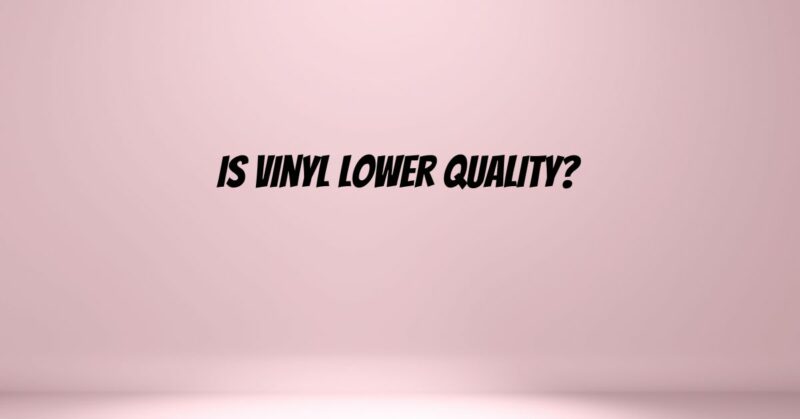Vinyl records have experienced a remarkable resurgence in recent years, captivating both seasoned audiophiles and newcomers alike. However, as digital formats and streaming services dominate the music landscape, questions about vinyl’s audio quality often arise. Is vinyl lower quality compared to digital formats? In this article, we’ll delve into the unique characteristics of vinyl records and explore whether they can be considered lower quality in today’s audio world.
The Analog Experience
Vinyl records offer a distinct and immersive listening experience that appeals to many music enthusiasts. However, it’s important to recognize that vinyl’s appeal lies in its analog nature, which differs significantly from digital audio:
- Analog Sound: Vinyl records reproduce sound in an analog format, capturing continuous waveforms. This analog nature is often celebrated for its warmth, depth, and organic qualities, which some listeners prefer over digital precision.
- Vinyl’s Sonic Signature: Vinyl records have a characteristic sonic signature, including occasional pops, crackles, and surface noise, which some listeners find endearing and nostalgic.
- Dynamic Range: Vinyl can offer excellent dynamic range, allowing for subtle nuances and greater detail in music when the recording and mastering are well done.
Digital Audio Quality
Digital audio, in formats like CDs and high-resolution digital files, is renowned for its accuracy and convenience. Some of the key aspects of digital audio quality include:
- Accuracy: Digital audio is based on sampling discrete points of a continuous audio waveform, resulting in high-fidelity and accurate reproduction.
- Consistency: Digital formats are consistent and free from the pops, crackles, and surface noise often associated with vinyl records.
- Convenience: Digital audio is easily portable, can be streamed, and provides instant access to vast music libraries.
Comparing Vinyl and Digital Quality
The question of whether vinyl is lower quality than digital formats depends on several factors:
- Subjectivity: Sound quality is highly subjective and influenced by personal preferences. Some listeners prefer vinyl’s analog warmth, while others favor the precision and clarity of digital audio.
- Condition and Equipment: The quality of playback equipment, the condition of the vinyl record, and the skill of the audio engineer all influence the perceived audio quality of vinyl.
- Recording and Mastering: The quality of the original recording and mastering process has a profound impact on vinyl sound quality. Well-executed vinyl pressings can offer exceptional audio quality.
- Digital vs. Analog Masters: In some cases, digital audio can be sourced from analog masters, meaning that the vinyl version and digital version originate from the same source, minimizing differences in quality.
- Vinyl’s Unique Characteristics: Vinyl’s occasional pops and crackles are inherent to the format and are often embraced as part of the listening experience.
Conclusion: A Matter of Preference
The question of whether vinyl is lower quality than digital formats lacks a definitive answer. Both formats have their strengths and limitations, and the choice between them often comes down to personal preference. Vinyl records offer a unique and nostalgic listening experience characterized by analog warmth and the tactile nature of handling records. Digital formats excel in accuracy, convenience, and consistency.
Ultimately, the perceived quality of vinyl vs. digital audio is a matter of individual taste and the specific attributes that matter most to you as a listener. Whether you prefer the nostalgia and analog charm of vinyl or the pristine precision of digital audio, the most important factor is enjoying the music in the format that brings you the most satisfaction.


